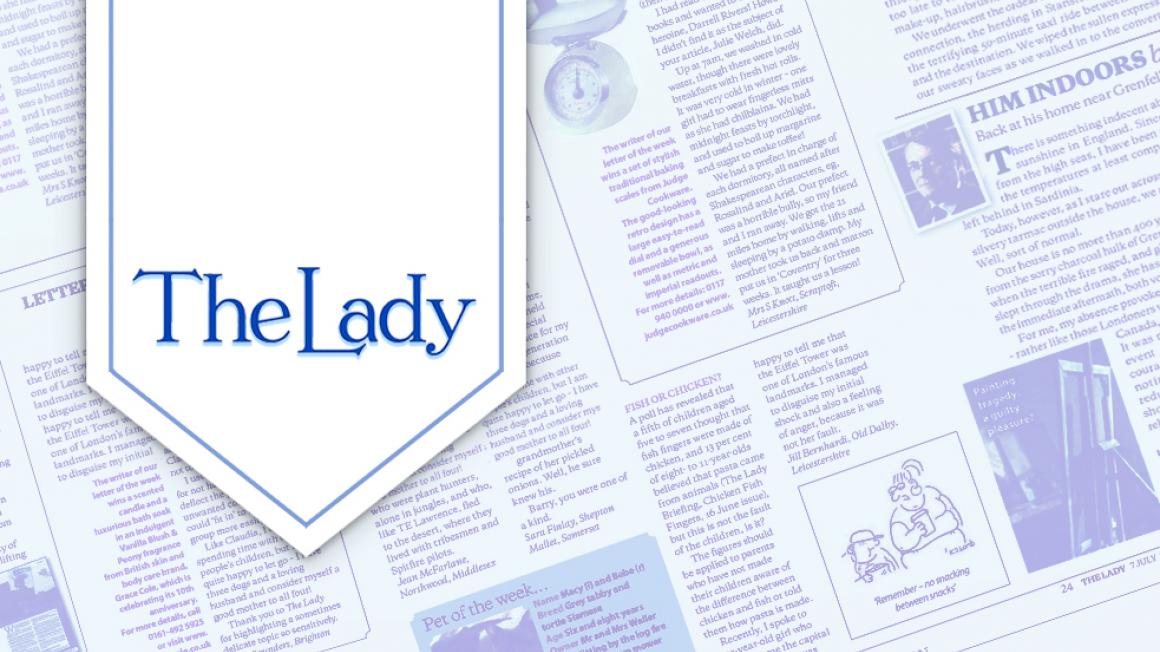Book Reviews: 8 February
OUT NOW
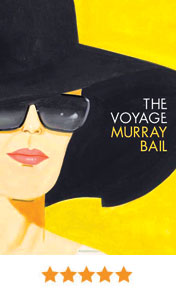 THE VOYAGE by Murray Bail (MacLehose Press, £12)
THE VOYAGE by Murray Bail (MacLehose Press, £12)Bail is an accomplished and inventive, prize-winning prose stylist with an impressive series of novels and short stories already to his credit. He attempts something quite new here, in this dazzling, first-person narrative, which resembles a type of uncertain monologue, jumping back and forth between past and present as his narrator Frank Delage takes a slow boat back from Europe to Australia.
Beautiful, lyrical, elegant, musical, often surprising and wittily allusive: it is a very readable and original example of high modernism’s delight in experimentation, delivered with genuine panache and quite remarkable skill.
Delage has pioneered a new kind of grand piano with a far clearer sound, which he has attempted to sell in Vienna, the home of music. Despite his relative lack of commercial success, he is befriended by Amalia von Schalla, the alluring matriarch of a grand, old Viennese family, and finds himself travelling back home to Australia with her beautiful, mysterious daughter, Elisabeth, who, having fallen in love, runs away with him.
It is a rich, amusing meditation on the difference between the cultures of the old world and the new, an exploration of naivety versus sophistication worthy of Henry James and a strange, enchanting love story full of laser-sharp observations on relationships. This deserves to be Booker nominated.
Steve Barfield
THE MIDWIFE OF HOPE RIVER by Patricia Harman (Corvus, £7.99)
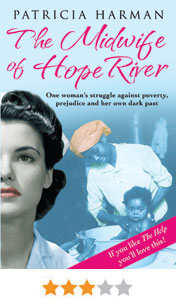 Just when you’d got used to the midwives of the 1950s – their grey uniforms, tentative use of gas and air and the way they sped to emergencies on bicycles – another former nurse is straining at the blocks, ready to launch her own midwifery memoirs.
Just when you’d got used to the midwives of the 1950s – their grey uniforms, tentative use of gas and air and the way they sped to emergencies on bicycles – another former nurse is straining at the blocks, ready to launch her own midwifery memoirs. Patricia Harman practised as a midwife in rural America in the 1960s and 1970s, but this is a fi ctional version, set in America in the Depression and features Patience, whose job it is to help the isolated, often uneducated, mothers of the region to deliver.
It’s a far cry from the convent in East London. Patience’s adversaries are not the petty villains and chauvinistic British dads of the 1950s, but unscrupulous mine owners and the Ku Klux Klan.
Indeed the opening chapter marries a potential still birth with the collapse of Wall Street. ‘The dead baby’s eyes are glazed and wide open. Then the ribs move, just a tremble, like an old lady’s hand. Holy Cow!’ Harman’s prose style is refreshingly direct: Wall Street may be toast, but the baby lives on. Even so, her book is not for the faint-hearted. ‘There is nothing stranger than the sight of a woman with a baby’s head sticking out of her, one life emerging from another’, Patience notes at one point. If you can stand the thought of that, then you’ll love toughtalking Patience and her gang of contracting women.
Lola Sinclair
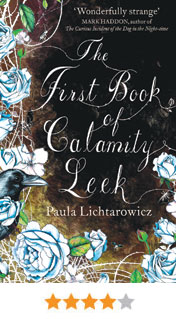 THE FIRST BOOK OF CALAMITY LEEK by Paula Lichtarowicz (Hutchinson, £12.99)
THE FIRST BOOK OF CALAMITY LEEK by Paula Lichtarowicz (Hutchinson, £12.99) Mark Haddon, author of The Curious Incident Of The Dog In The Night-Time, has called this novel ‘wonderfully strange’, but that scarcely covers it.
Abducted as a baby, its titular heroine has grown up in a barn on a walled Welsh estate along with her numerous sisters, all similarly snatched.
According to their ‘Aunt’ Ophelia – a one-eyed, alcoholic former musical-hall star – the girls’ purpose (when they’re finally let loose) is to wage war on ‘Demonmales’.
Their preparation for this has been thorough: not only have they been schooled in the feminine arts (‘snogging, slow dancing and groping’), Calamity and co. are also skilled at armed combat. But, as the reader soon gathers, Ophelia is no Miss Havisham, and a radical feminist revolution is probably the last thing on her mind.
With her sticky-out ears, runny nose and pungent turn of phrase, Calamity Leek is a true original, while Ophelia Swindon, ‘Operatic Opal of the Black Country’, is a creation so gloriously cracked as to be electrifying.
Like a mash-up of Margaret Atwood and Roald Dahl, this riotous, oddly affecting tale won’t be for all, but once picked up, it’s hard to put down.
Stephanie Cross
BOOK OF THE WEEK
Rebel against the ReichSteve Barfield on how an act of compassion and love in wartime, could have fearful consequences
CITY OF WOMEN by David R Gillham (Fig Tree, £12.99)
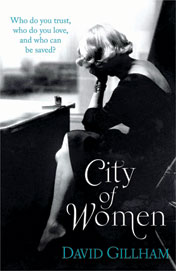 City Of Women is a brilliant, atmospheric evocation of Berlin in the Second World War, set during 1943. It’s a time when almost all the men are away at the front – so the focus is on the domestic lives of civilian women – lived under great duress and continual, everyday anxiety.
City Of Women is a brilliant, atmospheric evocation of Berlin in the Second World War, set during 1943. It’s a time when almost all the men are away at the front – so the focus is on the domestic lives of civilian women – lived under great duress and continual, everyday anxiety. David Gillham’s prose is sweeping and fi lmic in the way it presents the hub of Nazi Germany’s empire at its nadir, and the detail in his depiction of war-torn Berlin is impressive.
Sigrid Schröder, a stenographer, behaves like the model Wehrmacht soldier’s dutiful wife, looking after the crabby mother-in-law with whom she now lives. But Sigrid harbours strong emotions for her lost, former Jewish lover Egon, and recalls multicultural Berlin in the days before Hitler’s rise to power. Despite her domestic circumstances, she fi nds herself being asked by members of the German resistance to hide a Jewish family; it could even, possibly, be Egon’s family. Added to the fear this emotional connection causes, is the knowledge that she has now inadvertently become a rebel against the Reich. Her simple act of compassion and love is one with potentially fearful consequences.
There are twists, turns and surprises in the plot and a very real sense of the constant dangers facing Schröder and the other German characters caught up in the war. They are all living in an impossible situation. It is an unusual and moving story, made especially so, perhaps, because it is such an ordinary act of rebellion – and Schröder seems so oblivious to her own bravery and fortitude.
MUST READ
An old-fashioned bounderTHE PIKE: GABRIELE D’ANNUNZIO, POET, SEDUCER & PREACHER OF WAR by Lucy Hughes-Hallett (Fourth Estate, £25)
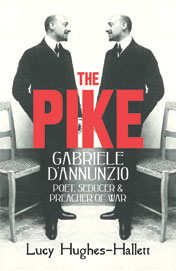 It’s 70 years since Gabriele d’Annunzio, the Italian poet, novelist, politician and womaniser, died, paving the way for a crowded field of biographies, of which Hughes- Hallett’s is by some way the most entertaining.
It’s 70 years since Gabriele d’Annunzio, the Italian poet, novelist, politician and womaniser, died, paving the way for a crowded field of biographies, of which Hughes- Hallett’s is by some way the most entertaining. D’Annunzio is a fascinating character, but such an oldfashioned cad and a bounder that one frequently has to put the book down to recover from his worst excesses. He was born in 1863 and became a literary superstar by writing louche novels that so thrilled the nation that by 1890 he had been elected to parliament as ‘the candidate for beauty’.
Like other Italian politicians since, his physical appearance (short, bald with dreadful teeth) did not stop him from being a terrific womaniser. In 1919 he led a quasi-invasion of Fiume and founded a citystate of which he was dictator. Having boasted that he was ‘the greatest liar in the world’, he retired to Lake Garda where he consumed great quantities of cocaine.
Hughes-Hallett’s very enjoyable book comes in at nearly 700 pages, affording plenty of opportunity to marvel over this man’s extraordinary life.
PAPERBACKS
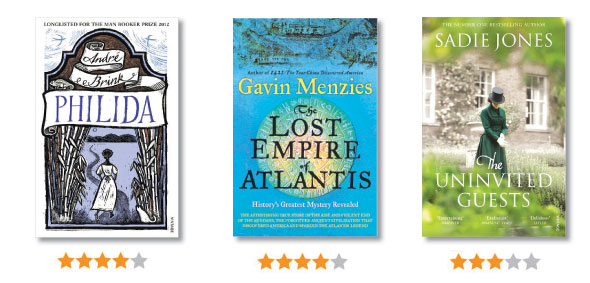
PHILIDA by Andre Brink (Vintage, £8.99) Brink’s powerful tale, set in South Africa, is based on the true story of a woman who was sold into slavery, but refuses to accept her fate. Philida was longlisted for the 2012 Booker prize. LS
THE LOST EMPIRE OF ATLANTIS by Gavin Menzies (Phoenix, £9.99)
The mystery of Plato’s legendary civilisation is apparently revealed by Menzies, one-time RN submarine commander, who believes Atlantis was the empire of the Minoans – a cultured people who traded in copper 1,500 years before China and Greece made their mark. Menzies’s theory on why the Minoans disappeared so abruptly is fascinating. Theo Walden
THE UNINVITED GUESTS by Sadie Jones (Vintage, £7.99)
On the eve of Emerald Torrington’s birthday dinner, a railway accident leads to an invasion of her crumbling family home by displaced passengers. Emerald and her eccentric family try to ignore their unwanted guests, but the arrival of a familiar face and the unpleasant behaviour of the railcrashers, make for a sinister affair. Alesha Bonser
ALSO PUBLISHED…
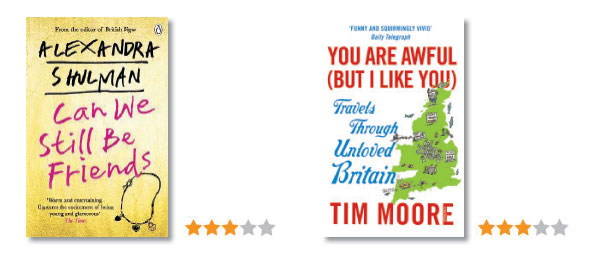
CAN WE STILL BE FRIENDS by Alexandra Shulman (Penguin, £7.99)If you came of age in the 1980s, this one’s for you. A readable novel in which three friends experiment with careers, fall in and out of love and test their friendship to destruction against a forensically researched background of late 20th century fashion, design and music.
YOU ARE AWFUL (BUT I LIKE YOU): TRAVELS THROUGH UNLOVED BRITAIN by Tim Moore (Vintage, £7.99)
Moore’s journey through the worst, most depressing bits of Britain, has its charm, unlike the places he visits – dying towns ruined by high-rises, caffs serving dreadful food, the whole leavened by a resilient and amusing populace. Home, in other words.
PULP FICTION
A Dishevelled DarcyFreya Langley on pulping up our favourite classics
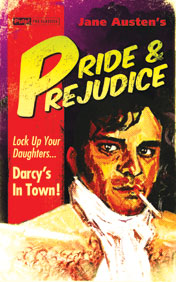 Lock up your daughters… Darcy’s in town!’ The latest salvo in a blast of events celebrating the 200th birthday of Pride And Prejudice is the brilliantly wacky retro yellow-and-red pulp edition of Jane Austen’s famous novel.
Lock up your daughters… Darcy’s in town!’ The latest salvo in a blast of events celebrating the 200th birthday of Pride And Prejudice is the brilliantly wacky retro yellow-and-red pulp edition of Jane Austen’s famous novel.On it, Darcy – or a rather hung-over Colin Firth lookalike – is pictured, fag in mouth, cravat coming undone in the style of a 1950s crooner, by artist David Mann. ‘Mrs Bennet is on a mission to marry off her fi ve daughters to rich men’, reads the jacket blurb. ‘Enter, Mr Charles Bingley and his rather fit friend, Darcy. Love, loathing and bittersweet romance follow…’
Even the edges of the book’s pages have been sprayed in a lurid red in the approved pulp fiction style. It could be the coolest thing that’s happened to English literature in a long time.
This edition of Pride & Prejudice is the brainchild of publishing company Pulp! The Classics. They’ve used the unabridged original text too, so you can safely give it to a GCSE student, who might even consider reading the whole thing, if presented in this format, rather than Coles Notes.
Other classics destined for the same treatment include The Great Gatsby (‘When it came to loving… He knew which Daisy to pick!’), Robinson Crusoe (‘Solitude Was Driving Him Nuts!’) and The Hound Of The Baskervilles (‘Murder… Mystery… Walkies!’).
PATRICK MOORE POEMS
Those of you who enjoyed reading the poems by Patrick Moore from his little book, Within The Glade, in our illustrated features last year, may still contact the publisher, SMH Books, if you wish to purchase a copy. Details at: www.smhbooks.co.uk email s.saer1@btinternet.com or telephone 01903-884968.Sadly, Sir Patrick died in December, but his fame and all his works will live on.


